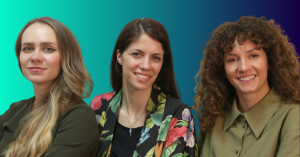If you had a pleasure to be at ViennaUP this year, you sure have noticed how well has Austria established itself as a promising location for startups in Europe. We can point that this is evidenced, for example, by the success stories of unicorns such as Bitpanda, Copadata, refurbed and TTTech Auto.
However, Austrian unicorns are only the tip of the iceberg on years long effort.
Austria’s startup cosystem has grown rapidly since 2013, with more than 3,700 startups founded, including 370 in 2024 alone. These ventures now employ around 30,000 people.
The IT & software development sector in Austria leads the way, comprising 30% of new startups, followed by deep tech (17%) and life sciences (14%), the latter being a traditional area of Austrian strength now enjoying a resurgence.
Last year also marked substantial funding rounds like the investments in Gropyus (€100 million), Storyblok (€74 million) and Prewave (€63 million). But this year is particularly special for their startup ecosystem, as for the first time in Austrian history, a state secretary for startups has been appointed.
In anticipation of the new Austrian Startup Monitor published today, we recently had opportunity to meet with Elisabeth Zehetner, the new State Secretary for Energy, Startups and Tourism. So, with those insights and latest figures, lets shed light on how Austria is building a coordinated, inclusive, and innovation-driven ecosystem.
In 2024, 19% of startup founders in Austria were international

Austria’s startup scene is becoming increasingly international. 19% of startup founders in 2024 were international, up four percentage points since 2022. Austria is also making gains in inclusion, 22% of new startups were founded by women, and 37% included at least one female founder—figures that place Austria at the top among EU member states.
Austria’s first-ever State Secretary for Startups underscored a federal commitment to young enterprises. “Austria has a lot to offer to international founders,” she said, highlighting the country’s talent pool, quality of life, and strong R&D incentives.
Austria’s central location, high purchasing power, and research funding make it an appealing destination for startups from across Europe and beyond. Since 2020, the Austrian Business Agency (ABA) has helped 181 international startups set up or expand operations in Austria. These ventures have invested €295 million. More than 1,160 new jobs have been or will be created within the context of these projects.
“In the coming years we will do a lot to make the Startup Location Austria even more attractive. As the first point of contact for international startups and founders, the ABA knows what it takes to assert itself in the competition to attract innovative young companies. The ABA supports them during the entire process of establishing business operations, links them up with cooperation and research partners and offers many other services – free of charge, as a service provided by the Republic of Austria,” State Secretary Zehetner adds.
Countries like Germany, the U.S., Italy, Switzerland, and Central and Eastern European neighbors (e.g., Slovakia, Hungary, Slovenia) are well-represented in Austria’s founder base. “When a company is founded in Austria, it’s an Austrian company,” officials said, but they noted that founding teams are often multinational in composition.
Fueling deep tech and academic spin-offs
Deep tech is a core pillar of Austria’s strategy. About 17% of new startups are classified as deep tech, often born from academic research. The government has tied university funding to spin-off performance through the Spin-Off Fellowships, incentivizing research commercialization.
These fellowships also provide additional incentives for researchers to embark on entrepreneurial paths, points Eva-Maria Holzleitner in newest Austrian Monitor Report. “Our goals as the Austrian federal government are ambitious: we have committed to supporting the creation of 90 new spin-offs within the performance agreements – a 33% increase compared to the previous period.”
This initiative already led to a steady increase in academic spin-offs over the last few years. The process is supported by a combination of incubators, accelerators, and funding programs operated in collaboration with universities. Notably, institutions like ISTA (Institute of Science and Technology Austria) and the Vienna University of Technology have set benchmarks in this area, with dedicated tech transfer offices and venture-building programs.
This public-private collaboration aims to enhance commercialization, with recent initiatives including a university-affiliated VC fund supported by Speedinvest. Austria ranks in the top three in the EU for direct R&D funding and offers a 14% research premium, making it highly attractive to innovation-driven enterprises.
However, challenges remain. Many researchers still hesitate to take the entrepreneurial plunge, and a cultural gap exists between academia and business. “We have a lot of young scientists with patents, but they do not want to make a business out of them. That’s an untapped potential,” a Zehetner noted. Bridging this gap through training, legal support, and funding remains a top priority.
Upcoming Fund of funds and accelerated company formation
Austria offers easier access to public funding than many of its peers—52% of startups receive public subsidies, which are often matched by private venture capital.
New instruments are being introduced to further unlock capital. A planned Austria Fund of Funds, backed by national and European investors and potentially the European Investment Fund (EIF), aims to provide growth capital for startups, scaleups, and spin-offs. Ongoing efforts to improve corporate venturing are gaining traction, with companies like Verbund X and Red Bull Ventures getting involved.
Austria has also made a name for itself with its proactive legal and administrative reforms designed to simplify the startup journey. One of the most notable developments is the introduction of the Flexible Company (FlexCo) legal form. Designed specifically with startups in mind, the FlexCo aims to bridge the gap between rigid corporate structures and the needs of fast-growing, investor-backed companies. Since January 2024, 700 companies registered through it.
Additionally, the government is exploring reforms to support employee stock option plans (ESOPs). “It’s not there. We want to have it,” officials admitted, noting legal changes are under discussion.
Austria’s startup future
Austria’s future startup roadmap also includes several bold goals:
- Full digitization of company formation procedures, allowing founders to register firms in under five working days.
- A reduction in non-wage labor costs, if fiscally feasible.
- Targeted programs for female entrepreneurs, including better access to capital, mentorship, and professional networks.
So far, Austria’s integrated and inclusive startup policy has positioned the country as a serious contender in Europe’s innovation race. From unicorns and deep tech pioneers to cross-sector integration and proactive government engagement, the building blocks are in place.







